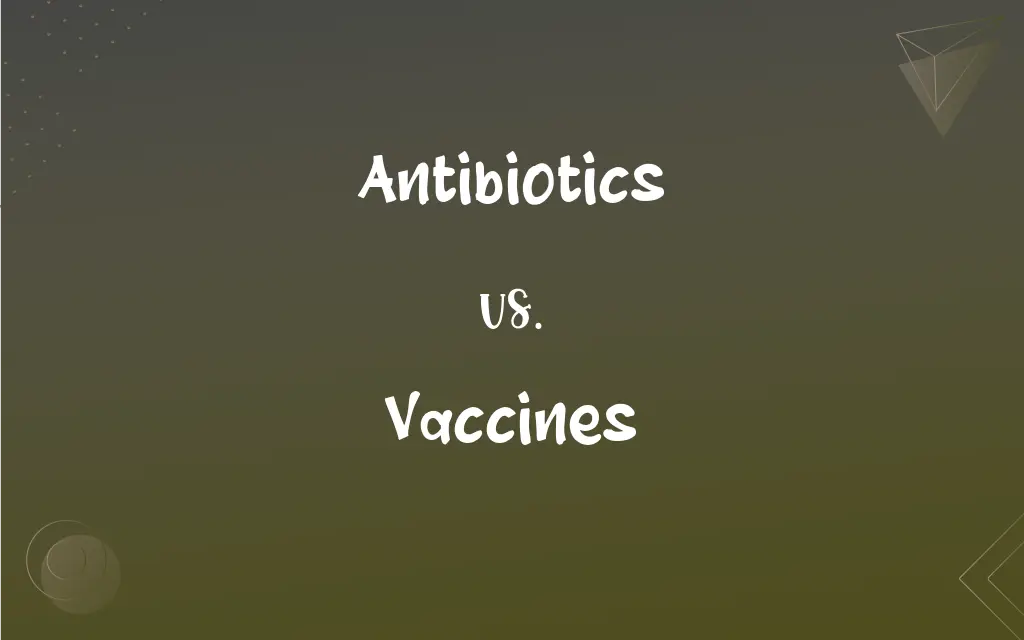Antibiotics vs. Vaccines: What's the Difference?
Edited by Harlon Moss || By Janet White || Published on January 9, 2024
Antibiotics are drugs used to treat bacterial infections, while vaccines are substances used to stimulate the immune system to prevent diseases.

Key Differences
Antibiotics are medications designed to combat bacterial infections. Vaccines, on the other hand, are biological preparations that provide active acquired immunity to particular diseases.
The primary role of antibiotics is to kill or inhibit the growth of bacteria, thus treating infections. Vaccines work by training the immune system to recognize and combat pathogens, either viruses or bacteria.
Antibiotics are used when a bacterial infection is present or suspected. Vaccines are administered as a preventive measure, often well before any exposure to the disease.
There are various types of antibiotics, each targeting different types of bacteria. Vaccines vary depending on the disease they are designed to prevent, such as measles, polio, or COVID-19.
The development of new antibiotics is crucial in the fight against antibiotic-resistant bacteria. Vaccine research focuses on developing effective immunization against emerging and existing diseases.
ADVERTISEMENT
Comparison Chart
Primary Purpose
Treat bacterial infections
Prevent diseases by immunization
Mechanism of Action
Kill or inhibit bacteria
Train immune system to recognize pathogens
Usage Timing
Used during infection
Administered before exposure to disease
Types
Broad-spectrum, narrow-spectrum, etc.
Live-attenuated, inactivated, mRNA, etc.
Focus of Development
Combatting antibiotic resistance
Developing immunity against new diseases
ADVERTISEMENT
Antibiotics and Vaccines Definitions
Antibiotics
Antibiotics are drugs used against bacteria, not viruses.
Antibiotics are ineffective against the common cold.
Vaccines
Vaccines are substances used to trigger an immune response for disease prevention.
The flu vaccine is recommended annually.
Antibiotics
Antibiotics are medications that destroy or slow down the growth of bacteria.
The doctor prescribed antibiotics for her strep throat.
Vaccines
Vaccines, preventive tools against viral and bacterial diseases.
The COVID-19 vaccine helped reduce the spread of the virus.
Antibiotics
Antibiotics are agents used to treat bacterial infections.
Antibiotics effectively treated his ear infection.
Vaccines
Vaccines are biological preparations that provide immunity to specific diseases.
The measles vaccine provides long-lasting immunity.
Antibiotics
Antibiotics, substances that can kill or inhibit bacteria.
She took antibiotics to combat her bacterial pneumonia.
Vaccines
Vaccines stimulate the immune system to protect against infectious diseases.
Children receive vaccines to prevent various diseases.
Antibiotics
Antibiotics, medical drugs for treating bacterial ailments.
The antibiotics cleared the bacterial skin infection.
Vaccines
Vaccines are immunizations that build resistance to specific pathogens.
He received a vaccine to prevent hepatitis.
Antibiotics
A substance, such as penicillin or erythromycin, produced by or derived from certain microorganisms, including fungi and bacteria, that can destroy or inhibit the growth of other microorganisms, especially bacteria. Antibiotics are widely used in the prevention and treatment of infectious diseases.
Vaccines
A preparation of a weakened or killed pathogen, such as a bacterium or virus, or of a portion of the pathogen's structure, that is administered to prevent or treat infection by the pathogen and that functions by stimulating the production of an immune response.
Antibiotics
Of or relating to antibiotics.
Vaccines
A preparation from the cowpox virus that protects against smallpox when administered to an individual.
Antibiotics
Of or relating to antibiosis.
Vaccines
(Computers) A software program designed to detect and stop the progress of computer viruses.
Antibiotics
Destroying life or preventing the inception or continuance of life.
Vaccines
Plural of vaccine
Antibiotics
Plural of antibiotic
FAQs
Can antibiotics treat viruses?
No, antibiotics are ineffective against viruses.
What are antibiotics used for?
Antibiotics are used to treat bacterial infections.
What is the purpose of vaccines?
Vaccines are used to prevent diseases by building immunity.
Do vaccines provide lifelong immunity?
Some vaccines provide lifelong immunity, while others require boosters.
Are vaccines safe?
Yes, vaccines are rigorously tested for safety and efficacy.
How do antibiotics work?
Antibiotics work by killing bacteria or preventing their growth.
How often are vaccines given?
Vaccine schedules vary based on the type and age of the recipient.
Should antibiotics be taken with food?
It depends on the antibiotic; some should be taken with food, others on an empty stomach.
Can antibiotics treat fungal infections?
No, antibiotics are not effective against fungal infections.
Can anyone get vaccinated?
Most people can, but there are exceptions based on health conditions.
Are there different types of vaccines?
Yes, including live-attenuated, inactivated, and mRNA vaccines.
Why are booster vaccines necessary?
Boosters strengthen or extend the vaccine's protective effects.
Are there natural antibiotics?
Some natural substances have antibiotic properties, but they're not a substitute for medical antibiotics.
Can antibiotics cause side effects?
Yes, antibiotics can have side effects, but they're generally well-tolerated.
What happens if you stop taking antibiotics early?
Stopping antibiotics early can lead to antibiotic resistance and incomplete treatment.
How are vaccines developed?
Vaccines are developed through a rigorous process of research, testing, and regulatory approval.
Do antibiotics interact with other medications?
Yes, antibiotics can interact with other drugs, affecting their efficacy or causing side effects.
Can antibiotic resistance be prevented?
Yes, by using antibiotics responsibly and only when necessary.
Are there new vaccines in development?
Yes, research is ongoing for new vaccines against various diseases.
Can vaccines cause the disease they're meant to prevent?
No, vaccines do not cause the diseases they're designed to prevent.
About Author
Written by
Janet WhiteJanet White has been an esteemed writer and blogger for Difference Wiki. Holding a Master's degree in Science and Medical Journalism from the prestigious Boston University, she has consistently demonstrated her expertise and passion for her field. When she's not immersed in her work, Janet relishes her time exercising, delving into a good book, and cherishing moments with friends and family.
Edited by
Harlon MossHarlon is a seasoned quality moderator and accomplished content writer for Difference Wiki. An alumnus of the prestigious University of California, he earned his degree in Computer Science. Leveraging his academic background, Harlon brings a meticulous and informed perspective to his work, ensuring content accuracy and excellence.






































































